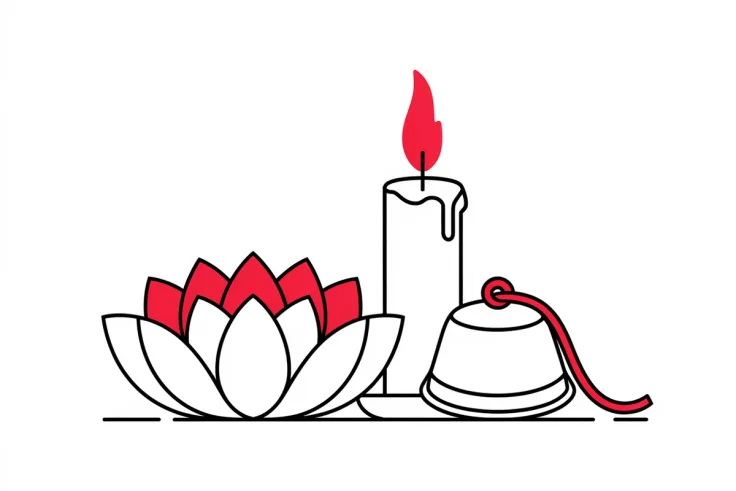What is Meditation? A Journey Through an Ancient Practice
Feb 16, 2025 • 7 min read
Meditation, at its core, represents a set of techniques designed to enhance awareness, cultivate presence, and develop a healthier relationship with our thoughts and emotions.
It's actually quite simple - you might focus on your breath, repeat a phrase, or just notice whatever's happening in the present moment. The beautiful thing about meditation is that there's no single "right" way to do it. Different approaches work for different people, and finding what works for you is part of the process. You're doing it "right" if you noticed improved emotional regulation, better attention, resilience, and if you become more in-tune with your mind.
When you meditate, you're simply sitting quietly and paying attention to your experience right now. You'll notice physical sensations, sounds, thoughts, and emotions. Your mind will wander - everyone's does - and that's completely fine. You just notice when this happens and gently bring your attention back to whatever you've chosen to focus on.
However, you'll see the most benefit if you let your mind "wander" naturally, but keep your meditation object, usually your breath or a mantra, as your primary focus. As long as your meditation object is your main focal point, thoughts can arise in your mind, and they can pass like clouds in the sky. If a thought overwhelms your attention and distracts you from your meditation object, gently redirect your attention back to your breath.
This straightforward practice gradually helps you develop better concentration and a deeper understanding of your emotions, attitudes, and approach to life.
Historical Context and Modern Practice
Meditation has deep roots in various spiritual traditions, but you don't need to be religious or spiritual to benefit from it. Buddhist practices, especially mindfulness meditation, have had a huge influence on how we approach meditation today. They figured out something really important about how our minds work - that we suffer not just because of what happens to us, but because of how we relate to our experiences.
Modern science has caught up with what these ancient practitioners discovered through experience. Brain imaging studies show that regular meditation creates real, measurable changes in how our brains function. These aren't just temporary effects - consistent practice actually reshapes neural pathways and changes how we process emotions and handle stress.
Different Types of Meditation
Mindfulness meditation involves observing your present moment experience without trying to change anything. You might notice thoughts, feelings, body sensations, or sounds. The key is just watching these experiences come and go without getting caught up in them. This helps you understand your patterns of thinking and emotional responses better.
Focused attention meditation builds concentration by maintaining attention on a single point of focus, usually the breath. When your mind wanders, you simply notice this and return to your breath. This really helps calm an overactive mind and improves your ability to stay focused in daily life.
Loving-kindness meditation develops compassion and positive emotions. You start by directing good wishes toward yourself, then gradually extend them to others - from close friends to difficult people. It's particularly effective for reducing negative self-talk and improving relationships.
There are many more types, but if you're a beginner, your first step should be to build a regular meditation practice. Don't get too bogged down in the details yet - the only way to see benefits is to practice regularly, ideally everyday, or multiple times per day if you have time. Keep your practice simple for now by sitting in a quiet area, set your intention for your meditation session, focus on the breath or a mantra, and redirect your attention when you realize you became distracted.
What Science Tells Us
The research on meditation is pretty impressive. Regular practice increases gray matter in brain regions responsible for memory, emotional regulation, and decision-making [1]Yuan, J. P., Connolly, C. G., Henje, E., Sugrue, L. P., Yang, T. T., Xu, D., & Tymofiyeva, O. (2020). Gray matter changes in adolescents participating in a meditation training. Frontiers in Human Neuroscience, 14, 319..
These changes affect how you handle stress, process emotions, and maintain focus. Your stress response system becomes more balanced, which improves immune function and sleep quality. You might notice you recover more quickly from stressful situations and feel more emotionally stable overall.
Real Changes You'll Notice
When you meditate regularly, you'll likely start noticing some changes in your daily life. Many practitioners report:
- Better stress management
- More emotional balance
- Improved focus and concentration
- Better sleep
- Healthier relationships
- Increased self-awareness
- Greater sense of calm
These benefits tend to develop gradually but consistently with regular practice. You might first notice small changes in how you respond to stress or handle difficult emotions.
Starting Your Practice
Starting a meditation practice is straightforward and doesn't require any special equipment or extensive preparation. Find a quiet spot where you won't be disturbed and set aside just five minutes - that's all you need to begin. Pick a time when you're likely to be alert but not too stressed, perhaps early morning or just before bed. Sit comfortably, whether in a chair or on a cushion, keeping your back reasonably straight but not rigid.
The actual practice is simple: close your eyes or soften your gaze, and bring your attention to your breath. You might notice the sensation of breathing at your nostrils, the rise and fall of your chest, or the movement of your belly. There's no need to change your breathing - just observe its natural rhythm. When you notice your mind has wandered, which it inevitably will, simply bring your attention back to breathing.
Don't worry about doing it perfectly or achieving any particular state of mind. Every time you notice your mind has wandered and bring it back to your breath, you're building awareness. That's the practice - nothing more complicated than that. Each moment of noticing and returning to the breath strengthens your capacity for attention and presence. You're developing a skill that will serve you well beyond your meditation sessions.
Many people find it helpful to start with guided meditations, which provide gentle reminders and instructions throughout the practice. Others prefer the simplicity of sitting quietly with their breath. Both approaches are equally valid - what matters most is finding a method that feels sustainable for you. Remember that meditation is a practice of self-discovery, and being curious about your experience is more important than following any rigid rules or expectations.
Common Challenges
It's normal to face some challenges when you start meditating, and understanding this can help you stay committed to your practice. You might find it hard to sit still, or your mind might feel especially busy and scattered. Many people interpret this mental activity as a sign they're "bad" at meditation, but the opposite is true - noticing a busy mind is actually a sign of developing awareness. You're becoming more conscious of what your mind is doing, rather than being lost in automatic patterns of thinking and reacting.
If you're struggling to maintain a regular practice, experiment with different times of day to find what works best for you. Many people find morning meditation particularly effective, before the day's activities create mental clutter and competing demands. Others prefer evening practice as a way to unwind and process the day's experiences. The key is finding a time that you can consistently protect for your practice. Even if you can only manage a few minutes, showing up regularly matters more than the duration of each session.
Building any new habit takes time and patience, and meditation is no different. Start by setting realistic expectations - perhaps committing to just five minutes daily for a week. Notice what helps you stay consistent and what creates obstacles. Maybe you need to set out your meditation cushion the night before, or put a reminder on your phone. Some people find it helpful to track their practice in a simple journal, noting how long they sat and any observations about their experience. These small steps can help establish meditation as a natural part of your daily routine.
Growing Your Practice
As you become more comfortable with meditation, you might naturally feel drawn to sit for longer periods. This organic expansion of your practice is wonderful, but remember that consistency matters more than duration. Regular ten-minute sessions will benefit you more than sporadic hour-long sits. The key is maintaining a sustainable rhythm that fits naturally into your life while gradually building your capacity for longer periods of practice.
Exploring different meditation techniques can help keep your practice fresh and engaging. You might start with basic breath awareness, then experiment with body scanning, loving-kindness practice, or walking meditation. Each technique develops different aspects of awareness and can be particularly helpful for specific situations - like using loving-kindness when dealing with difficult emotions, or walking meditation when you're feeling restless. Pay attention to which approaches resonate most strongly with you at different times.
Don't hesitate to adjust your practice as your needs and circumstances change. Some days you might benefit from a longer, deeper practice, while other days might call for brief moments of mindfulness scattered throughout your day. The skill lies in learning to read your own needs and responding flexibly while maintaining your commitment to regular practice. This balance between consistency and adaptability helps create a sustainable, long-term meditation practice that grows with you.
The Ongoing Benefits
Meditation continues to offer new insights and benefits over time. While you might start meditating for stress relief, you'll likely discover other valuable effects - maybe better focus at work, more patience with family, or a deeper understanding of yourself.
The practice isn't about achieving some perfect state of calm or eliminating all stress from your life. It's about developing a different relationship with your thoughts and emotions, one that allows you to navigate life's challenges with greater ease and awareness. Each session strengthens this capacity, contributing to lasting positive changes in how you experience and respond to life.
Sources
1. Yuan, J. P., Connolly, C. G., Henje, E., Sugrue, L. P., Yang, T. T., Xu, D., & Tymofiyeva, O. (2020). Gray matter changes in adolescents participating in a meditation training. Frontiers in Human Neuroscience, 14, 319.
DISCLAIMER: All articles, information, and other content on our website is for informational purposes only and is not a substitute for medical advice, diagnosis, or treatment. If you are experiencing mental health challenges or have concerns about your mental or physical health, please consult a qualified healthcare professional. Learn more →


